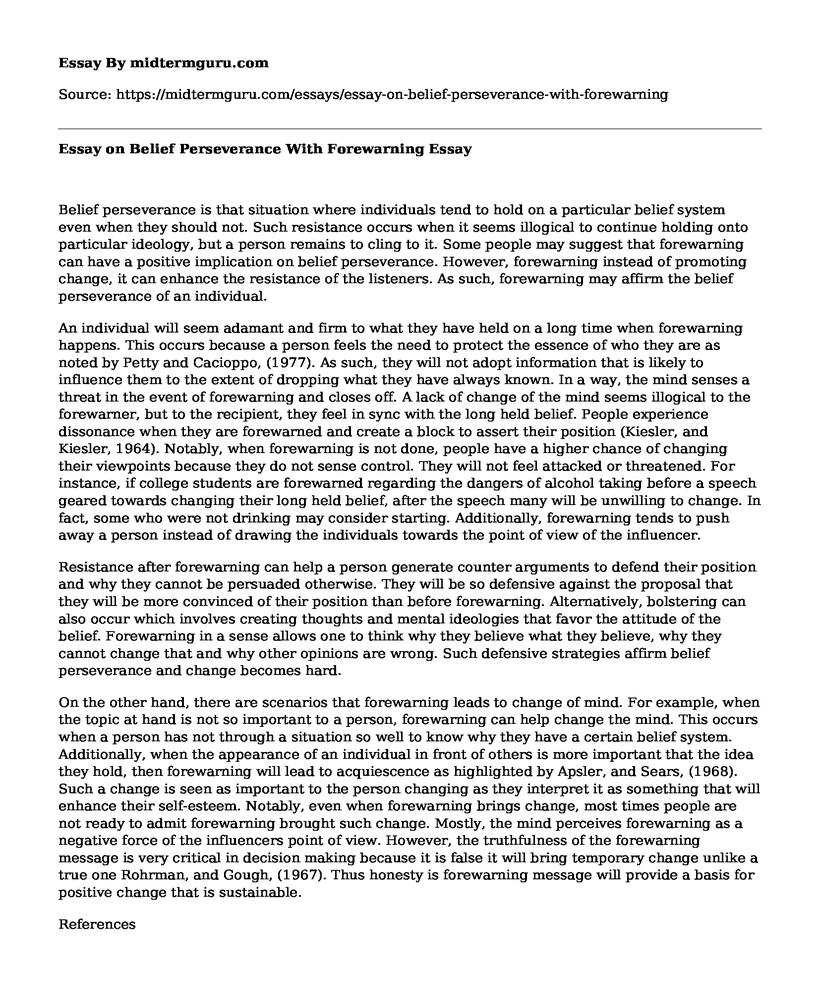Belief perseverance is that situation where individuals tend to hold on a particular belief system even when they should not. Such resistance occurs when it seems illogical to continue holding onto particular ideology, but a person remains to cling to it. Some people may suggest that forewarning can have a positive implication on belief perseverance. However, forewarning instead of promoting change, it can enhance the resistance of the listeners. As such, forewarning may affirm the belief perseverance of an individual.
An individual will seem adamant and firm to what they have held on a long time when forewarning happens. This occurs because a person feels the need to protect the essence of who they are as noted by Petty and Cacioppo, (1977). As such, they will not adopt information that is likely to influence them to the extent of dropping what they have always known. In a way, the mind senses a threat in the event of forewarning and closes off. A lack of change of the mind seems illogical to the forewarner, but to the recipient, they feel in sync with the long held belief. People experience dissonance when they are forewarned and create a block to assert their position (Kiesler, and Kiesler, 1964). Notably, when forewarning is not done, people have a higher chance of changing their viewpoints because they do not sense control. They will not feel attacked or threatened. For instance, if college students are forewarned regarding the dangers of alcohol taking before a speech geared towards changing their long held belief, after the speech many will be unwilling to change. In fact, some who were not drinking may consider starting. Additionally, forewarning tends to push away a person instead of drawing the individuals towards the point of view of the influencer.
Resistance after forewarning can help a person generate counter arguments to defend their position and why they cannot be persuaded otherwise. They will be so defensive against the proposal that they will be more convinced of their position than before forewarning. Alternatively, bolstering can also occur which involves creating thoughts and mental ideologies that favor the attitude of the belief. Forewarning in a sense allows one to think why they believe what they believe, why they cannot change that and why other opinions are wrong. Such defensive strategies affirm belief perseverance and change becomes hard.
On the other hand, there are scenarios that forewarning leads to change of mind. For example, when the topic at hand is not so important to a person, forewarning can help change the mind. This occurs when a person has not through a situation so well to know why they have a certain belief system. Additionally, when the appearance of an individual in front of others is more important that the idea they hold, then forewarning will lead to acquiescence as highlighted by Apsler, and Sears, (1968). Such a change is seen as important to the person changing as they interpret it as something that will enhance their self-esteem. Notably, even when forewarning brings change, most times people are not ready to admit forewarning brought such change. Mostly, the mind perceives forewarning as a negative force of the influencers point of view. However, the truthfulness of the forewarning message is very critical in decision making because it is false it will bring temporary change unlike a true one Rohrman, and Gough, (1967). Thus honesty is forewarning message will provide a basis for positive change that is sustainable.
References
Apsler, R., & Sears, D. O. (1968). Warning, personal involvement, and attitude change. Journal of personality and social psychology, 9(2), 162-166.
Freedman, J. L., & Sears, D. O. (1965). Warning, distraction, and resistance to influence. Journal of Personality and Social Psychology, 1(3), 262-266.
Kiesler, C. A., & Kiesler, S. B. (1964). Role of forewarning in persuasive communications. The Journal of Abnormal and Social Psychology, 68(5), 547.
Petty, R. E., & Cacioppo, J. T. (1977). Forewarning, cognitive responding, and resistance to persuasion. Journal of Personality and Social Psychology, 35(9), 645.
Rohrman, N. L., & Gough, P. B. (1967). Forewarning, meaning, and semantic decision latency. Psychonomic science, 9(4), 217-218.
Cite this page
Essay on Belief Perseverance With Forewarning. (2021, Jun 25). Retrieved from https://midtermguru.com/essays/essay-on-belief-perseverance-with-forewarning
If you are the original author of this essay and no longer wish to have it published on the midtermguru.com website, please click below to request its removal:
- Role of Implementing Social Media to Gain Sales Within Pan International
- Questions on Total Addressable Market - Paper Example
- Advertising Project for Netflix Company - Paper Example
- Paper Example on HSBC Holdings Strategic Plan
- Essay Sample on Apple: Inclusion & Diversity-Open
- Research Paper on Customer Relationship Management
- UPS: Modern Tech Improving Supply Chain, Developing Business Synergy - Essay Sample







